VAROLUŞÇULUĞUN SAVAŞ SONRASI İSPANYOL ROMANLARINA ETKİSİ
İspanya’da İç Savaş (1936-1939), Franco diktatörlüğünün başlangıcı, entelektüeller de dâhil olmak üzere birçok İspanyol'un sürgünü ve siyasi ve ideolojik sansürün de içinde bulunduğu faktörler, 1940'larda İspanyol kültürünün evrimini felce uğratmıştır. Edebiyat da böyle bir bilinç durumunu görmezden gelemezdi. Varoluşçuluğun 20. yüzyılda ön plana çıkmasında insanın içinde bulunduğu kriz durumu da etkili olmuştur. Savaşlardan çıkmış ve endüstrileşmiş toplumda kendine yabancılaşmış ve yalnız kalmış bireyin hayatta kalma mücadelesi, kendine dönmesi varoluşsal düşüncelere dalmasına neden olmuştur. Bu felsefi anlayışın dönemin düşünsel atmosferine bir tepki mahiyetinde olduğu düşünülebilir. Bu tepkinin özü, en genel anlamda “öznellik”, “bireysellik” ve “tutku” gibi değerlerin; “nesnellik”, “evrensellik” ve “akıl” gibi değerlerden daha önemli ve öncelikli olduğu iddiasıdır. Bu çalışmada 20. Yüzyılda ön plana çıkmış Varoluşçuluk felsefesinin İspanya’da oluşturduğu tepki ve savaş sonrası İspanyol romanlarına olan etkisi inceleme konusunu oluşturur. İspanya’daki varoluşçuluk akımı, ülkenin önde gelen düşünürü Miguel de Unamuno’nun düşünceleri bağlamında ele alınmış, varoluşçu düşüncelerin İspanyol ve Avrupa romanlarına yansımasının bir karşılaştırılması yapılmış olup bu düşüncelerin İspanyol romanlarına nasıl sirayet ettiği inceleyeceğimiz konular arasına girmiştir.
Anahtar Kelimeler:
İspanyol romanı, varoluşçuluk, Miguel de Unamuno, tremendismo, İspanyol romanı, varoluşçuluk, Miguel de Unamuno, tremendismo
The Effect of Existentialism on Post-War Spanish Novels
Factors including the Civil War (1936-1939), the onset of the Franco dictatorship, the deportation of many Spaniards, including intellectuals, and political and ideological censorship in Spain paralyzed the evolution of Spanish culture in the 1940s. Literature, too, could not ignore such a state of consciousness. The crisis situation of the human being was also effective in bringing existentialism to the forefront in the 20th century. The struggle for survival of the individual who has emerged from the wars and has become alienated and alone in the industrialized society has caused him to plunge into existential thoughts. It can be thought that this philosophical understanding is a reaction to the intellectual atmosphere of the period. The essence of this reaction is that values such as “subjectivity”, “individuality” and “passion” in the most general sense; It is the claim that “objectivity” is more important and prioritized than values such as “universality” and “reason”. In this study, the reaction of Existentialism, which came to the forefront in the 20th century, in Spain and its effect on post-war Spanish novels are the subject of analysis. The current of existentialism in Spain has been discussed in the context of the thoughts of Miguel de Unamuno, the leading thinker of the country, a comparison of the reflection of existential ideas on Spanish and European novels has been made, and how these ideas spread to Spanish novels has been among the topics we will examine.
Keywords:
Spanish novel, existentialism, Miguel de Unamuno, tremendismo,
___
- Barrero, Perez, O. (1987). La Novela Existencial Española de Posguerra. Madrid: Gredos.
- Ferrer, O, P. (1956). “La Literatura española, tremendista y su nexo con el existencialismo”. Revista Hispánica Moderna, Cilt XXII, Sayı 3-4 (Julio-Octubre) ss. 297-303.
- Marías, J. (1953). El existencialismo en España. Bogota: Universidad Nacional de Colombia.
- Mermall, T. (1978). La Retorica del humanismo. La Cultura española después de Ortega. Madrid: Taurus.
- Oromi, P. M. (1950). “Existencialismo por penúltima vez”. Colit, Sayı 1.
- Palley, J. (1961). “Existencialist Trends in The Modern Spanish Novel”. Hispania, XLIV, Sayı 1 ss. 21-26.
- Roberts, G. (1973). Temas Existenciales en la Novela Española. Madrid: Gredos.
- Sobejano, G. (1968). “Reflexiones sobre La Familia de Pascual Duarte”. Papeles de Son Armadans, Cilt XLVIII, Palma de Mallorca.
- Sobejano, G. (1970). Novela española de nuestro tiempo. Madrid: Editorial Prensa Española.
- Unamuno, M. De (1916). Ensayos. Tomo III. Madrid: Publicaciones de la Residencia de Estudiantes.
- Unamuno, M. De (Çev.) Osman Derinsu. (1986). Yaşamın Trajik Duygusu. İstanbul: İnkılap Yayınevi.
- Unamuno, M. De (2017). Vida de Don Quijote y Sancho. Madrid: Alianza Editorial.
- Vayá Menendez, J. (1966). “Unamuno, Filosofo Existencial”. Convivium: Revista de filosofía, Sayı 21 ss. 287-298.
- Yener Gökşenli, E. (2011). İç Savaş Sonrası İspanyol Romanına Yansıyan Tarihsel, Toplumsal ve Sosyal Çeşitliliğin İncelenmesi. Yayımlanmamış Doktora Tezi. İstanbul: İstanbul Üniversitesi
- ISSN: 2587-2621
- Yayın Aralığı: Yılda 3 Sayı
- Başlangıç: 2017
- Yayıncı: Mehmet Ali KARAMAN
Sayıdaki Diğer Makaleler
VAROLUŞÇULUĞUN SAVAŞ SONRASI İSPANYOL ROMANLARINA ETKİSİ
II. ABDÜLHAMİD DÖNEMİNDE BİR LİMAN KENTİ: DEDEAĞAÇ
İbrahim SERBESTOĞLU, Mim Sertaç TÜMTAŞ
ADA-YI TAHAFFUZUN MEMURLARI: KAMARAN ADASI ÖRNEĞİNDE TAHAFFUZHANE ÇALIŞANLARI (1882-1916)
ETKİNLİK PAZARLAMASI: AVANTAJLARI, ZORLUKLARI VE STRATEJİLERİ ÜZERİNE KAVRAMSAL BİR DEĞERLENDİRME
SELANİK ROMANYA KONSOLOSLUĞU VE FAALİYETLERİ (1879-1912)
KORUNMASI GEREKEN BİR YERLEŞİM: MİSİS
Temsili Demokrasi ve Temsil Kavramı: Meşrulaştırıcı mı Yoksa Kontrol Edici Bir İşleve mi Sahip?
